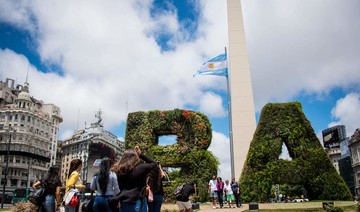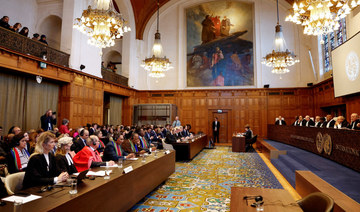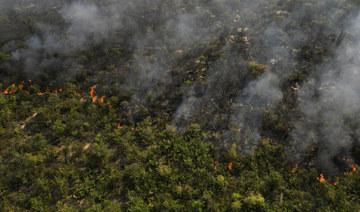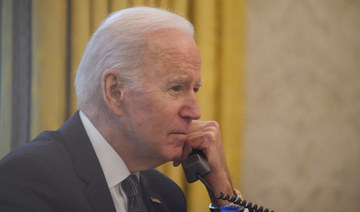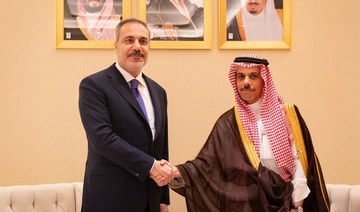DUBAI: The summit of the G20 nations assembling in Buenos Aires comes at a crucial time in world affairs, as well as a critical juncture in the economy of its host nation, Argentina.
For Saudi Arabia too, the meeting comes at an important crossroads – an opportunity to move its economic transformation strategy onto another level in the face of challenges at home and abroad.
While public perception of the G20 is based on the power-play politics on display over the traditional 48 hours of summitry, behind the scenes the gathering is a forum for the resolution of economic and financial issues.
The two days of in-your-face events are preceded by more discreet meetings of business leaders and financial officials — the legendary “sherpas” — from the member countries and their invitees; their discussions are decidedly economic, rather than political; their implicit agenda is to maintain economic stability within the existing financial framework.
Maybe this is why, over the course of the 10-year history of the G20, it has attracted more criticism and opposition from the left wing, and physical opposition from violent extremists, than any other multinational gathering.
The G20 is unashamedly a club of capitalists, even when its most populous member and second biggest economy, China, is still nominally a communist economy. In its decade in the capitalist inner sanctum, China has proven just as orthodox a capitalist as any of the other members, including the standard bearer of free enterprise, the US.
In 2009 at the G20 in Pittsburgh, China joined with the US to bail out the world with an expansionist program after the global financial crisis had led it to the brink, declaring itself a committed member of the club.
How different the atmosphere is in Buenos Aires. The global economic system seems to be on the point of fracture again, but this time there seems little chance of a US-China double act coming to the rescue.
The Costa Salguero Center on the edge of the Rio de la Plata will be the venue for the first meeting between US President Donald Trump and Chinese President Xi Jinping since, earlier this year, the former fired the opening shots in the “trade war” going on between them by declaring his intention to impose $250 billion of tariffs on Chinese imports.
China retaliated with its own tariffs, and there is a danger that the confrontation — which some American officials describe as merely a “skirmish” — will descend into a full-scale battle next year, when the tariffs take effect.
That would have serious consequences for a global economy that is looking increasingly fragile amid concerns that the financial system, too, is laboring under a weight of increased debt and overinflated asset prices.
China recently held out an olive branch, with deputy president Wang Qishan declaring his readiness to enter serious negotiations to avoid a breakdown in the global trade system. The hope is that Trump will hold off formally applying the tariffs in January.
But in Buenos Aires, nobody is expecting too much from the dinner that the two presidents have arranged on Friday night.
By then, the first full day of the summit will have been completed, and President Mauricio Macri of Argentina will be hoping that it has gone off without the major incidents that have been threatened by home-grown and international agitators.
If there was a repeat of the serious football-related violence that broke out in Buenos Aires recently, it would take the shine off his attempts to claim that Argentina had turned a corner in its economic troubles, in the run-up to presidential elections next year.
Macri was elected three years ago in a burst of optimism that his reformist policies would put the Argentine economy on the road to stability after years of boom-and-bust cycles, interspersed corruption scandals, and domestic unrest.
For a while it seemed to be working, and winning the G20 was seen as a mark of approval by the international community for his presidency.
But recently the old Argentine malaise has come back with a vengeance. The peso has lost 50 percent of its value against the dollar this year, Argentine financial markets have been chaotic, and inflation has soared to more than 30 percent per annum. Some Argentinians complain they cannot afford steak.
Macri has stabilized the situation in recent weeks, with the IMF giving its blessing in a series of measures to stabilize the economy and the financial system.
But Argentine citizens are still having to live with an austerity program that threatens their standard of living, and it would not take much for ordinary citizens — the ones who have not taken Macri’s advice to have a long weekend away from Buenos Aires — to join protests that could easily descend into violent confrontation as the G20 leaders meet.
That would be an embarrassment for Macri in front of his fellow leaders, and would also distract from the rest of the very worthy G20 program.
While the media is salivating for a Trump-Xi confrontation on trade, more fireworks on climate change and street protest, the compilers of the G20 program have actually put together a formal agenda that reflects some of the other genuine concerns of the international community.
The theme of the Buenos Aires G20 — as it is the case increasingly with international forums from Davos to Singapore — is sustainability. The world has to live within it means, both in terms of energy, environment, society and finance.
The Argentine G20’s self-declared goals are to focus solutions on the future of work, infrastructure for development, viable food production and consumption, and the inclusion of more women in the global workforce, all against the backdrop of the rapid technological change turning most aspects of the economic process on its head.
That coincides with many of the goals of Saudi Arabia’s Vision 2030, which Saudi policymakers — led by Crown Prince Mohammed bin Salman — will be at pains to stress is still on track in Buenos Aires. The event gives the opportunity to reassert the project’s credentials on the international stage after a period of uncertainty in crucial global energy markets and changes in the international perception of the Kingdom.
Some aspects of the Vision 2030 program — like the initial public offering of Saudi Aramco originally slated for next year — have been modified in line with changing circumstances, and lower oil prices threaten to alter the fiscal mathematics for the Kingdom’s economic policymakers.
As the biggest economy in the Middle East, a leading oil producer and a long-standing member of the G20, Saudi Arabia will retain its role and its influence in Buenos Aires. The top-level delegation will be working hard behind the scenes, at the bilateral and “retreat” events at the summit center, to argue its case among its global peers.
It all promises to be an instructive lesson in the stagecraft, and statecraft, that goes into hosting a G20 summit, which, after a move to Japan next year, is planned to be held in Saudi Arabia in 2020, its first time in the Middle East.
Why the G20 matters now for both Saudi Arabia and the international community
Why the G20 matters now for both Saudi Arabia and the international community
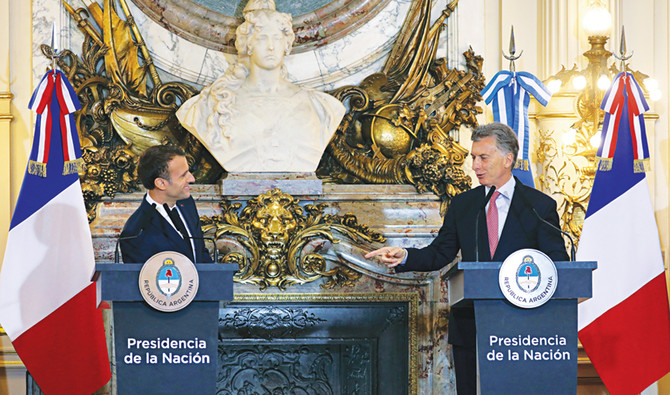
- The world is hoping the US and China will resolve their trade war
- Saudi Arabia will showcase Vision 2030 on the global stage
The Taliban are working to woo tourists to Afghanistan
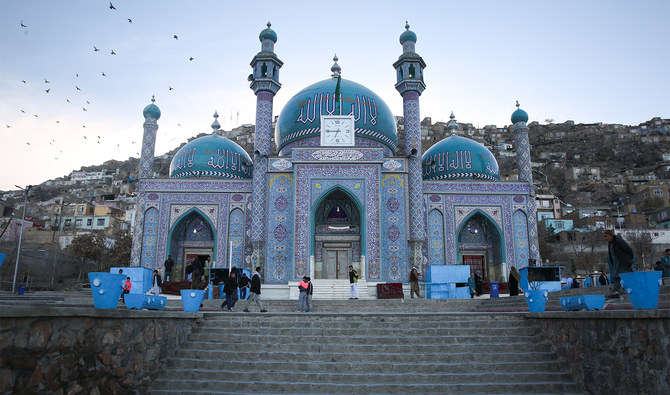
- Foreigners encouraged by sharp drop in violence, increased flight connections to hubs like Dubai are visiting Afghanistan
KABUL, Afghanistan: Around 30 men are crammed into a Kabul classroom, part of the debut student cohort at a Taliban-run institute training tourism and hospitality professionals.
It’s a motley crew. One student is a model. Another is 17 and has no job history.
The students vary in age, education level and professional experience. They’re all men — Afghan women are banned from studying beyond sixth grade — and they don’t know anything about tourism or hospitality. But they are all eager to promote a different side of Afghanistan. And the Taliban are happy to help.
Afghanistan’s rulers are pariahs on the global stage, largely because of their restrictions on women and girls. The economy is struggling, infrastructure is poor, and poverty is rife.
And yet, foreigners are visiting the country, encouraged by the sharp drop in violence, increased flight connections with hubs like Dubai, and the bragging rights that come with vacationing in an unusual destination. The numbers aren’t huge — they never were — but there’s a buzz around Afghan tourism.
In 2021, there were 691 foreign tourists. In 2022, that figure rose to 2,300. Last year, there were 7,000.
Mohammad Saeed, the head of the Tourism Directorate in Kabul, said the biggest foreign visitor market is China because of its proximity and large population. Afghanistan also has advantages over some of its neighbors.
“They’ve told me they don’t want to go to Pakistan because it’s dangerous and they get attacked. The Japanese have said this to me also,” Saeed said. “This is good for us.”
But there are disadvantages, too.
Visas are difficult and expensive to access. Many countries severed ties with Afghanistan after the Taliban returned to power, and no country recognizes them as the legitimate rulers of the country.
Afghan embassies either closed or suspended their operations. There’s an ongoing power struggle between Afghanistan’s embassies and consulates staffed by people from the former Western-backed administration, and those under the Taliban administration’s full control.
Saeed concedes there are obstacles for Afghan tourism to develop but said he was working with ministries to overcome them.
His ultimate aim is to have a visa on arrival for tourists, but that could be years away. There are problems with the road network, which is half-paved or non-existent in some parts of the country, and airlines largely avoid Afghan airspace.
The capital Kabul has the most international flights, but no Afghan airport has direct routes with major tourist markets like China, Europe, or India.
Despite the challenges, Saeed wants Afghanistan to become a tourism powerhouse, an ambition that appears to be backed by the Taliban’s top leaders.
“I have been sent to this department on the instructions of the elders (ministers). They must trust me because they’ve sent me to this important place.”
The students also have aspirations. The model, Ahmed Massoud Talash, wants to learn about Afghanistan’s picturesque spots for Instagram posts and its history for media appearances.
Business school graduate Samir Ahmadzai wants to open a hotel but thinks he should know more about tourism and hospitality first.
“They hear that Afghanistan is backwards, poverty and all about war,” said Ahmadzai. “We have 5,000 years of history. There should be a new page of Afghanistan.”
Classes include Afghan handicrafts and anthropology basics.
An unofficial subject is how to interact with foreign women and how their behavior or habits could clash with local customs and edicts. Examples might be women smoking or eating in public, to mixing freely with men who are not related to them by blood or marriage.
The Taliban have imposed a dress code for women and requirements for them to have a male guardian, or mahram, when they travel. Dining alone, traveling alone, and socializing with other women in public have become harder. With gyms closed to women and beauty salons banned, there are fewer places where they can meet outside the home.
In a sign that the country is preparing for more overseas visitors, the country’s only five-star hotel, the Serena, has reopened its women’s spa and salon for foreign females after a monthslong closure.
Foreigners must show their passport to access services. Women with “born in Afghanistan” on their ID are barred.
The restrictions on Afghan women and girls weigh on overseas travel companies, who say they try to focus on the positive aspect of cultural interactions by making donations, supporting local projects or only visiting family-run businesses.
Shane Horan, the founder of Rocky Road Travel, said visiting Afghanistan should not be seen as an endorsement of any particular government or political regime.
“Ultimately, the goal should be to support responsible tourism practices that contribute positively to the local economy and foster mutual respect and understanding, while also remaining cognizant of the broader political context in Afghanistan.”
He said there was no input from authorities about what tour groups saw or did, and that the company worked closely with a women’s rights organization in Afghanistan. A percentage of the tour cost went into supporting this organization’s programs, Horan added.
There are no women at the Institute of Tourism & Hotel Management. The students don’t mention it. But an official at the Tourism Directorate does.
“It’s a heartbreaking situation,” said the official, who wished to remain anonymous for fear of reprisals. “Even female family members ask if they can study here. But there was a change in policy with the change in government. The women who were studying before (the takeover) never came back. They never graduated.”
Top UN court to rule in Germany ‘genocide’ case over Gaza
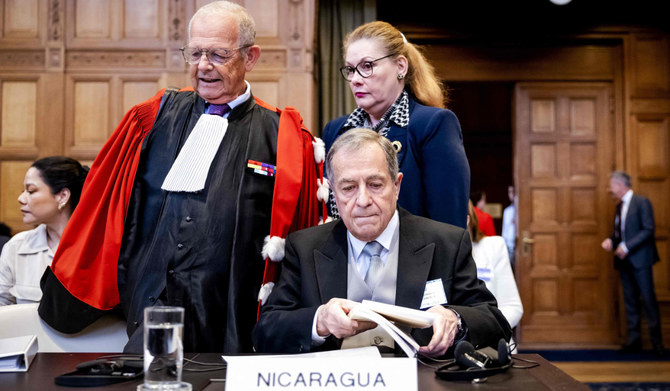
- Israel has killed at least 34,488 people in Gaza, mostly women and children, according to the Hamas-run territory’s health ministry
- Press reports have identified a battalion called the Netzah Yehuda, composed mainly of ultra-Orthodox Jews, as being accused of abuses. It is about 1,000-strong and since 2022 has been stationed in the West Bank, which Israel has occupied since 1967
THE HAGUE: The United Nations’ top court will on Tuesday rule on charges by Nicaragua that Germany is breaching the 1948 Genocide Convention by supplying arms to Israel for the Gaza war.
Nicaragua has hauled Germany before the International Court of Justice (ICJ) to demand that judges impose emergency measures to stop Berlin from providing Israel with weapons and other assistance.
More than 34,000 people have been killed in the Palestinian territory since war broke out in October following a cross-border attack by Hamas that left around 1,170 Israelis dead.
The ICJ in The Hague is scheduled to issue an order at 3:00 p.m. (1300 GMT).
Nicaragua targeted Germany rather than Israel’s main ally, the United States, because Washington did not recognize the ICJ’s jurisdiction in the case, Managua’s lawyers have said.
They say Israel is in breach of the 1948 Genocide Convention.
Top lawyers from the two countries clashed earlier this month at the court, with Nicaragua saying Germany was “pathetic” to be both providing weapons to Israel and aid to Gazans.
Berlin retorted that Israel’s security was at the “core” of its foreign policy and argued that Nicaragua had “grossly distorted” Germany’s supply of military aid to Israel.
“Germany only supplies arms based on a meticulous scrutiny that far exceeds the demands of international law,” said Tania von Uslar-Gleichen, a German representative to the ICJ.
Those supplies are “subject to a continuous evaluation of the situation on the ground,” she added.
“The moment we look closely, Nicaragua’s accusations fall apart,” Christian Tams, another representative for Germany, told the court.
Nicaragua requested five emergency measures, including that Germany “immediately suspend its aid to Israel, in particular its military assistance including military equipment.”
The war began with an unprecedented Hamas attack that resulted in the deaths of about 1,170 people in Israel, according to an AFP tally of Israeli official figures.
Israel vowed to destroy Hamas, with a retaliatory offensive that has killed at least 34,488 people in Gaza, mostly women and children, according to the Hamas-run territory’s health ministry.
Cases relating to the Gaza war brought before the ICJ are closely followed.
In another procedure, South Africa has accused Israel — which like the US is not a member of the court — of perpetuating genocide in the Gaza Strip.
Israel “categorically” denies the South African accusations, which include responsibility for starvation.
In that case, the court called on Israel to do everything in its power to prevent genocide and recently ordered the country to “ensure urgent humanitarian assistance” in Gaza without delay.
Even though ICJ decisions are binding, the court has no mechanism to enforce them.
For example, it ordered Russia to cease its invasion of Ukraine, in vain.
Philippine students are told to stay home as Southeast Asia swelters in prolonged heat wave
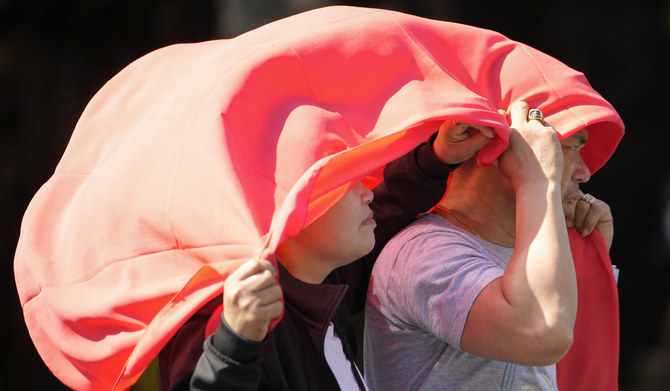
- The Philippines is among the nations worst affected by the sweltering weather in Southeast Asia, where the intense tropical summer heat worsened by humidity forced class cancelations in recent weeks and sparked fears of water shortages, power outages
MANILA, Philippines: Southeast Asia was coping with a weekslong heat wave on Monday as record-high temperatures led to school closings in several countries and urgent health warnings throughout the region.
Millions of students in all public schools across the Philippines were ordered to stay home Monday after authorities canceled in-person classes for two days. The main advice for everyone, everywhere has been to avoid outdoor activities and drink plenty of water, but the young and the elderly were told to be especially careful.
Cambodia this year is facing the highest temperatures in 170 years, Chan Yutha, a spokesperson for the Ministry of Water Resources and Meteorology, told The Associated Press on Monday. His agency has forecast that temperatures in most parts of the country could reach up to 43 degrees Celsius (109 degrees Fahrenheit) this week.
Myanmar’s meteorological department said Monday that seven townships in the central Magway, Mandalay, Sagaing and Bago regions experienced record-high temperatures. Several towns in Myanmar last week were on lists of the hottest spots worldwide.
Chauk township in Magway, historically the country’s hottest region, saw Myanmar’s highest temperature at 48.2 degrees Celsius (118.8 degrees Fahrenheit), breaking the previous record of 47.4 degrees Celsius (117.3 degrees Fahrenheit) set in 1968.
The Philippines is among the nations worst affected by the sweltering weather in Southeast Asia, where the intense tropical summer heat worsened by humidity forced class cancelations in recent weeks and sparked fears of water shortages, power outages and damage to agricultural crops.
The Department of Education ordered students in more than 47,000 public schools to switch to home-based and online learning due to health risks from record-high temperatures and a three-day strike starting Monday by drivers who oppose a government program they fear would remove dilapidated passenger jeepneys from streets.
Large crowds have sought relief in air-conditioned shopping malls in Metropolitan Manila, the congested capital region of more than 14 million people where the temperature soared to 38.8 degrees Celsius (101.84 Fahrenheit) Saturday, surpassing the record set decades ago, according to weather officials.
In Thailand, temperatures have topped 44 C (111 F) in some areas in the northern parts of the country, while the capital Bangkok and metropolitan areas have seen temperatures go above 40 C (104 F). The forecast from the Meteorological Department said this year’s summer, which usually lasts from late February to late May, is expected to be 1-2 degrees hotter than last year, and rainfall will be lower than average.
Thailand’s Department of Disease Control said last week that at least 30 people have died from heatstroke so far this year, compared to 37 for all of last year.
Scientists have said the number of heat-related deaths around the world has been rising significantly in recent years along with temperatures, but the trend in Asia this year so far is unclear, partly because of the question of how to classify deaths that appear to be heat related.
At least 34 people have fallen ill due to the extreme heat in the Philippines so far this year, including six who died. The Department of Health said it was verifying what exactly caused the deaths.
Media in Bangladesh reported that in a five-day period earlier this month, at least 20 people died from heatstroke.
In Cambodia, however, officials indicated there were few if any heat-related fatalities. The Khmer Times, an online news platform, quoted the head of the Health Department of Phnom Penh, the capital, saying there had been no heat-related deaths or collapses.
Israel-Hamas war protesters and police clash on Texas campus, Columbia University begins suspensions
Israel-Hamas war protesters and police clash on Texas campus, Columbia University begins suspensions
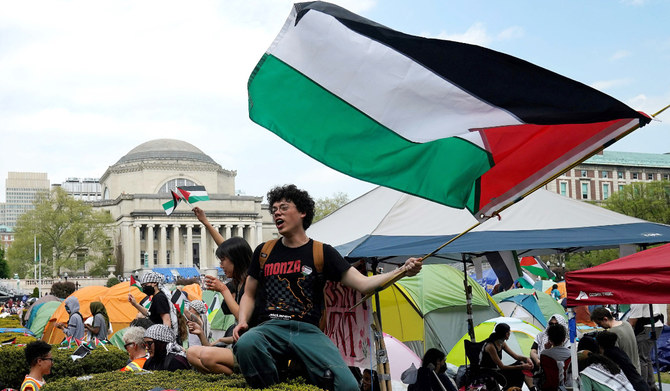
- At Columbia, student activists defied a 2 p.m. deadline to leave an encampment of around 120 tents on the school’s Manhattan campus
- Israel has killed more than 34,000 Palestinians in Gaza, mostly women and children, according to the health ministry in the Hamas-run territory
NEW YORK: Protesters and police clashed Monday at the University of Texas in a confrontation that resulted in dozens of arrests, and Columbia University began issuing suspensions as colleges around the US begged pro-Palestinian demonstrators to clear out tent encampments as commencement ceremonies approach.
From coast to coast, demonstrators are sparring over the Israel-Hamas war and its mounting death toll, and the number of arrests at campuses nationwide is approaching 1,000 as the final days of class wrap up. The outcry is forcing colleges to reckon with their financial ties to Israel, as well as their support for free speech.
The protests have even spread to Europe, with French police removing dozens of students from the Sorbonne university after pro-Palestinian protesters occupied the main courtyard. In Canada, student protest camps have popped up at the University of Ottawa, McGill University in Montreal and the University of British Columbia in Vancouver, The Canadian Press reported.
At the University of Texas at Austin, an attorney said at least 40 demonstrators had been arrested Monday, some of them by officers in riot gear who encircled about 100 sitting protesters, dragging or carrying them out one by one amid screams. Another group of demonstrators trapped police and a van full of arrestees between buildings, creating a mass of bodies pushing and shoving and prompting the officers to use pepper spray and flash-bang devices to clear the crowd.
The confrontation was an escalation on the 50,000-student campus in the state’s capital. On social media, Republican Gov. Greg Abbott reposted video of state troopers arriving, saying “No encampments will be allowed.” Just last week, hundreds of police pushed into protesters at the university, arresting more than 50 people.
The Texas protest and others grew out of Columbia’s early demonstrations that have continued. On Monday, student activists at Columbia defied a 2 p.m. deadline to leave an encampment of around 120 tents on the school’s Manhattan campus. Instead, hundreds of protesters marched around the quad, clapping, chanting and weaving around piles of temporary flooring and green carpeting meant for graduation ceremonies that are supposed to begin next week.
A handful of counter-demonstrators waved Israeli flags, and one held a sign reading, “Where are the anti-Hamas chants?”
The university didn’t call police to roust the demonstrators. But three hours after the deadline passed, school spokesperson Ben Chang said Columbia had begun suspending students. He didn’t indicate how many students were involved. He also didn’t say how the suspensions would be carried out or whether suspended students would be ejected from the campus.
Chang said that while the university appreciated the free speech rights of students, the encampment was a “noisy distraction” that was interfering with teaching and preparation for for final exams. The protests also made some Jewish students deeply uncomfortable, he said.
Protest organizers said they were not aware of any suspensions as of Monday evening.
The notice sent to protesters earlier Monday said if they left by the deadline and signed a form committing to abide by university policies through June 2025, they could finish the semester in good standing. If not, the letter said, they would be suspended, pending further investigation.
College classes are wrapping up for the semester, and campuses are preparing for graduation ceremonies, giving schools an extra incentive to clear encampments. The University of Southern California canceled its main graduation ceremony.
But students dug in their heels at other high-profile universities, with standoffs continuing at Harvard, the University of Pennsylvania, Yale and others.
Protesters at Yale set up a new camp with dozens of tents Sunday, nearly a week after police arrested nearly 50 and cleared a similar one nearby. They were notified by a Yale official that they could face discipline, including suspension, and possible arrest if they continued.
Yale said in a statement Monday that while it supports peaceful protests and freedom of speech, it does not tolerate policy violations such as the encampment. School officials said that the protest is near residential colleges where many students are studying for final exams, and that permission must be granted for groups to hold events and put up structures on campus.
In a rare case, Northwestern University said it reached an agreement with students and faculty who represent the majority of protesters on its campus near Chicago. It allows peaceful demonstrations through the June 1 end of spring classes, requires removal of all tents except one for aid, and restricts the demonstration area to allow only students, faculty and staff unless the university approves otherwise.
At Brown University in Rhode Island, school President Christina H. Paxton offered protest leaders the chance to meet with officials to discuss their arguments for divestment from Israel-linked companies in exchange for ending an encampment.
In the letter to student protesters at Columbia, school officials noted that exams are beginning and graduation is upcoming.
“We urge you to remove the encampment so that we do not deprive your fellow students, their families and friends of this momentous occasion,” the letter said.
The demonstrations have led Columbia to hold remote classes. The school said in an email to students that bringing back police “at this time” would be counterproductive. The university said it will offer an alternative venue for the protests after exams and graduation.
Columbia’s handling of the protests has prompted federal complaints.
A class-action lawsuit on behalf of Jewish students alleges a breach of contract by Columbia, claiming the university failed to maintain a safe learning environment, despite policies and promises. It also challenges the move away from in-person classes and seeks quick court action requiring Columbia to provide security for the students.
Meanwhile, a legal group representing pro-Palestinian students is urging the US Department of Education’s civil rights office to investigate Columbia’s compliance with the Civil Rights Act of 1964 for how they have been treated.
A university spokesperson declined to comment on the complaints.
The plight of students who have been arrested has become a central part of protests, with the students and a growing number of faculty demanding amnesty for protesters. At issue is whether the suspensions and legal records will follow students through their adult lives.
Demonstrators on other campuses, meanwhile, said they would stand firm. Jacob Ginn, a second-year University of North Carolina sociology graduate student, said he had been protesting at the encampment for four days, including negotiations with administrators Friday.
“We are prepared for everything and we will remain here until the university meets our demands and we will remain steadfast and strong in the face of any brutality and repression that they try to attack us with,” Ginn said in reference to a potential police sweep of the encampment.
US President holds separate calls with leaders from Qatar, Egypt over Gaza ceasefire talks

- The danger of a military escalation in Rafah was also stressed, in how it would add catastrophe to an already worsening humanitarian crisis that would impact stability and security in the region, the statement said
CAIRO: Egyptian President Abdel Fattah El-Sisi received a phone call on Monday from US President Joe Biden to discuss the latest developments in negotiations over a ceasefire in Gaza and the dangers of a military escalation in Rafah, a statement from Egypt’s presidency said.
The spokesman for the Egyptian Presidency said the call also touched on the exchange of Israeli hostages for Palestinian prisoners, a main sticking point in any comprehensive ceasefire deal between Hamas and Israel.
A Hamas delegation is currently in Cairo to deliberate on Israel’s response to a ceasefire deal.
The danger of a military escalation in Rafah was also stressed, in how it would add catastrophe to an already worsening humanitarian crisis that would impact stability and security in the region, the statement said.
“President El-Sisi stressed the necessity of full and adequate access to humanitarian aid, reviewing the intensive Egyptian efforts in this regard.
The two presidents also stressed the necessity of working to prevent the expansion of the conflict and reaffirmed the importance of the two-state solution as the means to achieve security, peace, and stability in the region,” the Egyptian presidency statement said.
Biden also held a phone call late on Monday with Qatar’s Emir Sheikh Tamim bin Hamad Al Thani, whose country has also played a role as mediator to the conflict.
“During the call, they discussed developments in the situation in the Gaza Strip and the occupied Palestinian territories, and efforts of the two countries to reach an immediate and permanent ceasefire agreement in Gaza,” Qatar’s Emiri Diwan said in a statement.




